Editor’s Note: The world of SEO changes quickly and in this update to our 2018 SEO predictions and trends article, we will be discussing what we can expect in terms of the evolution of SEO over the months and years to come. Our original post was created in January 2018, so we wanted to take fresh look at the topic and give readers an updated opinion where things stand when it comes to SEO and the likely changes ahead.
How was our prediction? How is search and SEO evolving?
- 1 How was our prediction? How is search and SEO evolving?
- 2 Impact of voice search
- 3 Featured Snippets and SEO
- 4 Will I need to overhaul my SEO strategy any time soon?
- 5 SEO predictions and trends to watch in the future? How will search change decades from now?
- 6 — 2018 article ‘Top 10 SEO Predictions & Trends for 2018’ —
- 7 The changing face of SEO
-
8
Our Top 10 SEO predictions and trends to watch out for in 2018
- 8.1 SEO Prediction 1 – optimisation for SERP (search engine results pages) will continue to be at the heart of SEO
- 8.2 SEO Prediction 2 – voice search will grow in popularity and importance
- 8.3 Prediction 3 – featured snippets will become more prominent
- 8.4 SEO Prediction 4 – users will need to get technical with rich snippets and schema markup
- 8.5 SEO Prediction 5 – Google My Business and localised marketing will become more integral to SEO
- 8.6 SEO Prediction 6 – there will be an increased focus on knowledge panels
- 8.7 SEO Prediction 7 – AI and Google’s RankBrain will play a more significant role in search
- 8.8 SEO Prediction 8 – optimisation for single keyword searches will continue to fall in favour of ‘long tail’ and Latent semantic indexing (LSI)
- 8.9 SEO Prediction 9 – mobile optimisation and adoption of AMP will be more important than ever
- 8.10 SEO Prediction 10 – speed and page load times will continue to be an important differentiator
- 9 Other trends and predictions worth noting
- 10 Final thoughts…
Impact of voice search
In our original article, we made various predictions about where we thought SEO was heading in 2018. We initially predicted that voice search would increasingly become a regular go-to for searches online.
According to Alpine.AI. / WordStream.com, there were a billion voice searches carried out per month as of January 2018 with that number set to continue to increase with the ever-growing adoption rate of in-home smart speaker systems and smart devices. In order to predict future search trends based on newly released technology, we look to the past to see what affect newly released technology had on voice search and SEO. As you can see in the graph below from SearchEngineLand, ‘voice related commands’ had risen 35% since the launch of Google Voice Search in 2008 to 2016.
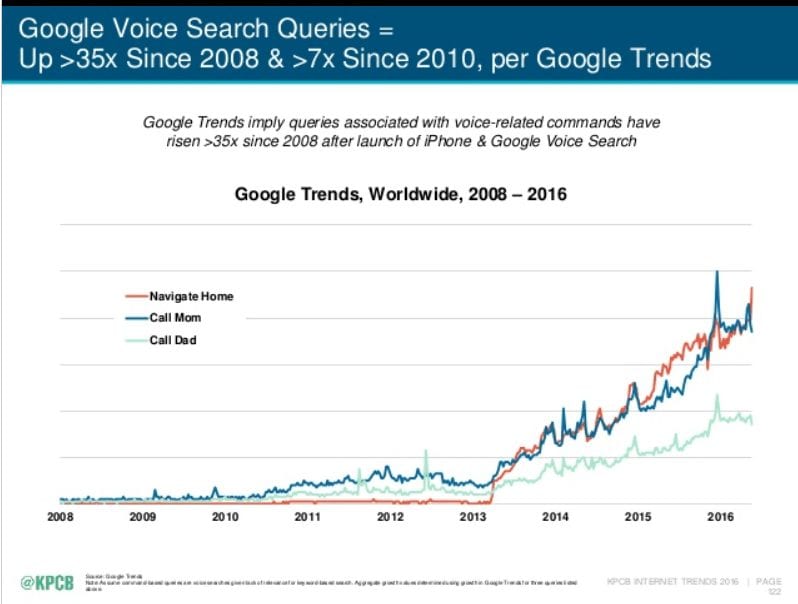
Chart showing the increase in ‘voice related commands’ since the launch of Google Voice Search in 2008 to 2016
Image Credit SearchEngineLand
It’s easy to understand the surge of popularity after the release of devices such as the iPhone. We can expect to see a similar surge in the coming year(s) with the release of smart speakers and other smart home devices, where searches are entirely carried out by voice. Not only will this have a direct affect based on the actual devices, but it will familiarise users with voice search as a whole, allowing users to be more comfortable with it as a concept. This should translate to more overall voice searches taking place across devices.
Featured Snippets and SEO
We covered topics such as SERPs and Featured Snippets, predicting they will be an increasingly popular feature within Google searches. This has certainly been the case during 2019 so we decided to give a more detailed explanation of Featured Snippets (Google Questions) in one of our recent FAQs.
Recent data suggests more and more users are getting the information they need from Google searches without having to leave the site, meaning that tools like Featured Snippets are becoming increasingly wide-ranging in addition to being frequently used. From our own personal experience here at Opace, it’s one of the most notable SEO trends we are seeing right now, with a general movement towards Q&A style results, both in terms of Featured Snippets and the more traditional organic search results.
Let’s look at the example below for one of our long-standing SEO clients. One of their target keywords was the incredibly popular search “laser cleaning” with 8,100 average global searches per month according to Google’s Keyword Planner tool. Our strategy for getting them to rank for the keyword was to devise a “hub” of useful Q&A style information and articles to answer specific questions, along with the usual SEO strategies and techniques to help optimise the content.
Let’s take a look at how they are doing:

Q&A style content and the impact on Featured Snippets and SEO
For such an important keyword, they rank position 1 with their money/service page, position 2 with their “How Fiber Laser Cleaning Works” page and look at the massive amount of space their Featured Snippet is getting getting on the righthand side. Not only are we seeing a question and answer, but five eye catching visuals to attract click throughs. Apart from the Google Shopping results, our client is dominating virtually all of Google’s ‘above the fold’ real-estate.
This is definitely something that will continue to shape the way we search, giving users instant information that is accurate without the need to leave the search engine results page. As SEO people, business owners and marketers, we need to think about what users are actually searching for and the kinds of content that Google is favouring as a result. Quite often ranking on page 1 (or even position 1) can be possible without the need for expensive backlinks or clever marketing tactics, by simply giving the user interesting and informative content.
Additionally, Featured Snippets in mobile searches can even tell you which part of a video has the most relevant information to your query.
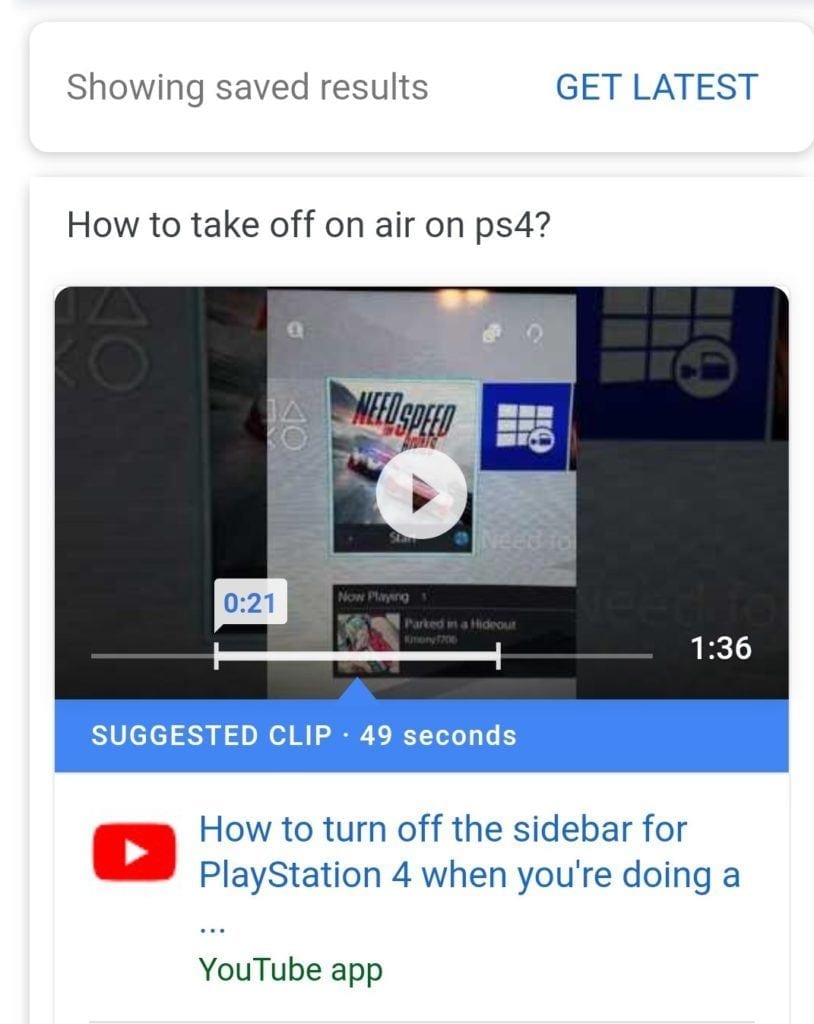
Featured Snippets in mobile searches highlighting most relevant part of video
We can definitely expect Google to utilise Featured Snippets more and display information (where possible) from third-party apps that may have relevant information to what the user is searching for. Because of this, more and more businesses will be trying to optimise their content further to be eligible for inclusion in Featured Snippets.
Will I need to overhaul my SEO strategy any time soon?
Although SEO is certainly changing, it’s more of an incremental shift rather than a sudden set of changes. Many blogs and articles on the topic seem to overstate the immediate significance of new types of search, such as voice. While these are very important and will inevitably be at the forefront of future search, text-based searches will remain essential for years to come.
Giving users access to more data at a glance within search results will continue to be a very important priority for Google throughout 2019 and beyond. The trend will continue for search engines like Google to show a range of useful information based on the search query, with relevant rich media, business and map data, product/pricing data, featured snippets (questions and answers) and traditional search results. This is not only very convenient for the user, but will continue to be built upon into the future.
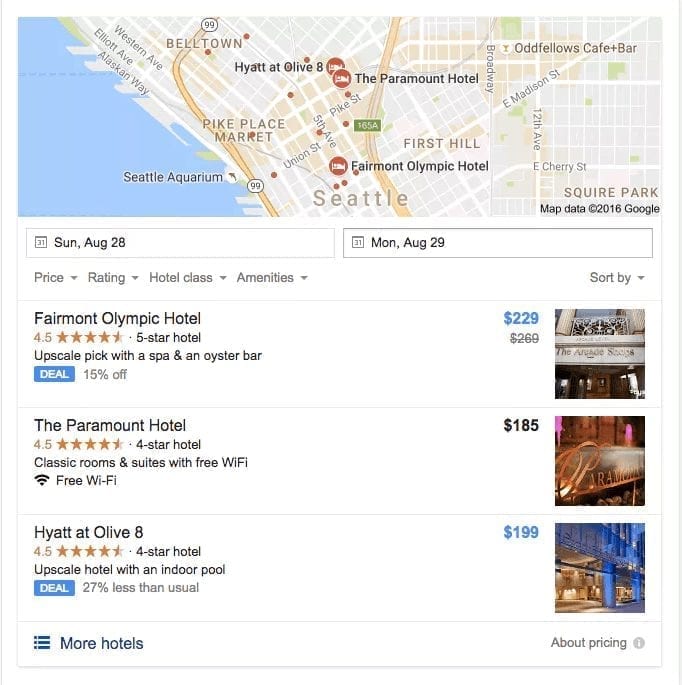
Google Maps and My Business search results
Image credit Moz
SEO predictions and trends to watch in the future? How will search change decades from now?
As depicted in the Iron Man movies via ‘Jarvis’ (an intelligent assistant), handsfree search and operation of a device that feeds back data accurately and instantly isn’t just a cool sci-fi dream and novelty but an essential evolution of our already existing ‘on demand’ devices and services.
Now, I’m not predicting we’ll all be flying around in iron suits saving the world while searching Google. My point is, the form factor of devices we use to deliver the request for data will change, but the need for instant information to be received by the user will remain.
Search services linking together seamlessly
Over the coming decades, I would predict a hybrid system of search services linking together seamlessly. Something like Apple’s Siri but better connected to everything in your life. Due to the logistics of how this would be achieved, it’s easy to imagine shifting emphasis from optimising for just one search engine (like Google) to the devices carrying out the searches. The ability to have multiple data services linked together (including biometric) to provide an all-encompassing comprehensive search functionality will be easier to achieve by integrating them seamlessly on a device, rather than a search company like Google trying to integrate everything together. That said, maybe Google will have an easier time doing this by way of their Android devices that already have deep Google integration and are widely used by many people worldwide.
Search will get more personal
We’re already seeing the beginnings of digital home augmentation with services such as Apple’s ‘HomeKit’ providing digital control and statistics over home lighting and even apps that give detailed statistics about electricity in modern homes.
In the not too distant future, we’ll be able to ask our smart device which lamps or appliances have been left on at home, what traffic is like on the main roads ahead and even what our current blood pressure or blood sugar levels are. This isn’t too much of a jump as we have access to that data now, it’s just not easily consolidated and presented. Search will become much more personal and important to our health and wellbeing, in addition to carrying out traditional type searches for information (biometric searches based on your health included).
With the release of devices such as Apple Watch tracking heart rate and health in general, it’s easy to imagine more searches such as “How is my resting heart rate relative to the average” becoming increasingly popular as more biometric data is collected. It’s also easy to imagine a more direct data link to doctors, healthcare services and professionals from our devices that track our health. Data will be accessible and searchable by doctors allowing them to identify more illnesses based on biometric data collected by devices consistently over the previous months.
‘Inverted’ client-side SEO
With all that being said, there will of course still be a need to search for products or services the ‘old fashioned way’, but in the future I feel many searches will be carried out and processed relative to the circumstances and preferences of the user. What I mean by that, is we will get to a point where businesses and services provide all the data that they can relevant to the search queries that are applicable. At that point it will be important for searches to take in to consideration the searcher’s personal preferences based on previous trends or other data on record and then predict the right results.
For example, if I’m staying in a hotel my requirements are – a hotel with free WIFI and gym access. Now, I won’t want to be typing that in every time I search for a hotel but over time search engines will learn from my searches, so all I will have to search for is ‘Hotel’ and Google will automatically eliminate any hotels from search that doesn’t have gym access or free Wi-Fi as Google knows this is something that I require based on past searches. It’s a smarter evolution of what we already have, as of course you can select check boxes on hotel sites but it’s just cumbersome and slow compared to what will eventually be possible.
Google (or future devices with omni-connected services) will learn more about the users and we will shift emphasis from the listings themselves to the actual users doing the searching. Something of an ‘inverted SEO’ will be important where optimisation can take place client-side rather than service / server side. It will be essential to give as much data as possible to your device so that it becomes familiar with your preferred way to experience services or products. The more the device learns about the person doing the search, the more accurate and personal the search results will be.
For those interested, here you can find a detailed guide providing our most essential SEO tips to increase your Google ranking, covering aspects ranging from SEO planning to engaging potential users.
Editor’s Note: We’ve given our original post from January 2018 some fresh new ideas and thoughts on the on the current and future state of search and SEO. For our original article, please read below.
— 2018 article ‘Top 10 SEO Predictions & Trends for 2018’ —
Here we explore some of our top SEO predictions and trends to watch out for in 2018. Some are considerably retrospective whilst others predict major shifts in current thinking with the occasional doomsayer predicting a collapse of traditional SEO methods.
The changing face of SEO
SEO pundits are constantly evaluating the evolving landscape of SEO practices. Much of the changes that we have seen, prompting SEO predictions over the last decade, has a lot to do with the internet giant Google and the company’s updates that hugely impact the way marketers implement SEO practices. Google has taken steps to ensure that manipulative SEO practices have become obsolete. Marketers are therefore being encouraged to follow ‘white hat’ SEO practices to ensure that their client’s websites remain visible across search engines. As we move into 2018, it is imperative that we take a long, hard look into the latest SEO changes, predictions and new emerging trends for the year ahead.
Google’ search engine algorithm is now a hugely complex affair that many believe takes into account more than 200 factors that influence the way the world’s most popular search engine ranks websites and pulls up pages during a search. Google says that it continually strives to improve their process in order to enhance the quality of search results. As a result, previous ranking factors become obsolete or less important, while completely new ones become significant.
Whilst we can’t know exactly what 2018 will bring, we do know the landscape in which we will be working. Our SEO predictions for 2018 take into account the upcoming trends. We look at how they impact searches, how you can prepare for these and how these trends can help you stay ahead of the pack in 2018.
It’s clear that developments in artificial intelligence in search engines and a greater uptake in voice search technology will see the need for websites to adopt new techniques to advance their SEO. Optimising for mobile isn’t new but with the rollout of Google’s Mobile First Index now underway, there is an urgency to make this happen. Schema markup and the advanced structured data which powers Featured Snippets, Local Business Data and e-commerce pricing are here to stay. Sites that don’t leverage this powerful parsing tool can expect to see a decline in traffic as a result. Of course, building on the trends of previous years and maintaining that momentum by continually working on improving user experience, carrying out good on-site technical SEO, delivering interesting content marketing strategies, high quality, relevant link building and improved social media engagement will also be critical to SEO success in 2018. Underpinning all of this will undoubtedly be a greater reliance on analytics and understanding the whole customer journey.

2018 is likely to witness significant developments in the field of SEO. Image via Pexels.
Our Top 10 SEO predictions and trends to watch out for in 2018
SEO Prediction 1 – optimisation for SERP (search engine results pages) will continue to be at the heart of SEO
A search engine results page is the page that Google returns in response to a search query. The SERP contains results that have been retrieved by Google’s algorithm, for example: shopping results, local business listings, sponsored page links which are paid for by advertisers, organic results, and so on. Organic listings are generally displayed as a link, which points to the actual page where the relevant content is published. In addition a short description is included under the link. For sponsored links, the advertiser chooses the content to be displayed. As part of our SEO predictions for 2018, let’s take a quick look at what actions content marketers can take as SERP becomes an important factor for SEO practitioners.
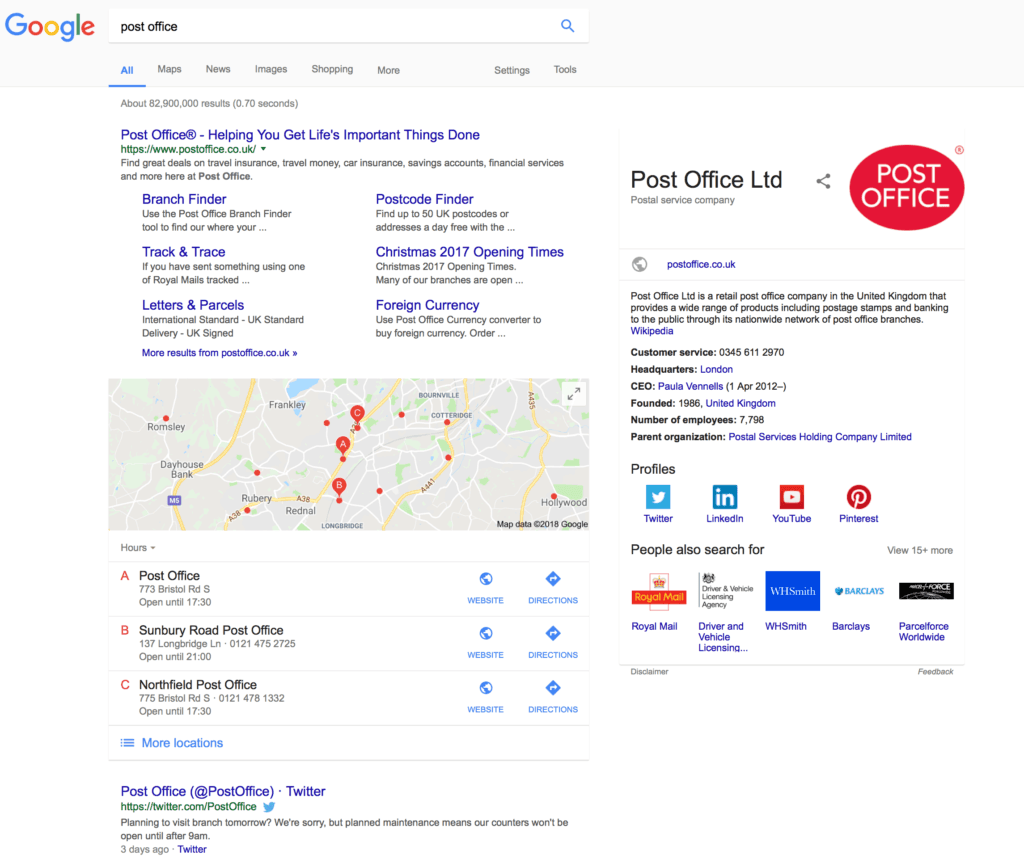
Example SERPs page showing different types of organic listings.
The meta title and meta description tags for pages are important marketing tools that can affect the rankings and click through rates. This is going to continue to be an important tend in 2018. Google has boosted the number of pixels it allocates for each listing, up from 500 to about 600 pixels. Therefore, the number of characters available for titles and descriptions has also increased to 70 – 71 characters, up from an earlier limit of 50 to 60. On mobiles, this limit can be higher, up to 78 characters. Meta descriptions are also up to almost 300 characters across three to four lines. In keeping with these SERP changes, content writers need to write for their audiences in order to enhance value and not specifically for Google. It is important to keep targeted and actionable keywords in the first few positions of the meta description, as well as the meta title. An important element of our SEO predictions for 2018 is that more than 70% of internet activity will come from smart mobiles. In order to optimise titles keeping in mind mobile users, we need to assume that the title will appear on two lines. However, if the title is more than 70 characters, Google may replace it with an auto-generated one. So, from an SEO predictions perspective, it’s important to write the title within these parameters.
For meta descriptions, it’s important to include the most important and actionable keywords early in the first sentence. Meta descriptions should ideally be expanded to around 200 characters. Paying attention to appropriate SERP parameters will make your content stands out on Google and establishes it’s prominence during organic searches.
SEO Prediction 2 – voice search will grow in popularity and importance
The growth of voice technology has been a leading influencer in 2017 with devices like Google’s ‘Home’ and Amazon’s ‘Echo’ being widely marketed. This new breed of virtual personal assistant builds on voice-automated search functionality that has been in use for several years including Siri and Alexa.
Though voice search technology has been around a while, its functionality has not been widely adopted, mainly due to the discrepancies in how traditional search engines have been built. The flaws are all too obvious in hindsight; disjointed searches based on keystroke predictability doesn’t lend itself to natural speech.

Voice search will start to change how SEO content is being driven. Image via Flickr.
However, Google has been amongst the first search engines to hone the way we search by incorporating natural speech queries into its search algorithms. SEO predictions by several SEO experts forecast that by 2020, 50% of all internet searches will be voice searches. Already, 55% of all teens and 40% of adults use voice search on a daily basis. Voice search queries are longer than text queries and use snippets that are conversational in nature. This means, in order to adapt our SEO optimisation for voice searches, we need to evolve our keyword strategy. This is likely to be an important trend in 2018, in line with our other SEO predictions. Keywords need to be more long tailed and must mimic the way people speak. A practical way to get to these phrases may be to record customer calls to understand the specific phrases people use and the questions they ask. Then, you can focus on building a voice keyword strategy.
In 2018, this could mean a two-way split as content creators battle for two types of exposure; traditional forms of comprehensive content and more longtail Q&A type pieces designed to answer questions quickly (see Feature Snippets, below).
Prediction 3 – featured snippets will become more prominent
Featured snippets have become an accepted part of the Google landscape. Known as ‘Quick Answers’, these highlighted pieces of content are returned by Google (and others are following) in response to a search query in an effort to provide at-a-glance answers.
The featured snippet uses schema markup and this data is usually displayed on top of the first SERP page in immediate response to the query. Featured snippets offer marketers a unique marketing opportunity and this is likely to score high on the radar for content marketers in the coming year. However, getting featured on the snippet is an organic process and depends on content writing that answers queries in the most relevant way. It’s not essential to rank position 1 in Google to show in a featured snippet. Research shows that only a third of featured snippets are pulled from the number 1 position, while the others come from positions 2-5.

The Google search engine results page (SERP) is slowly evolving as an important tool. Image via Pixabay.
Whilst content written as a featured snippet can perform well in SERP, the CTRs tend to be low as users get the information they need without even needing to leave the search engine. Whether you support the appearance of these readily digestible results or not, they are certainly here to stay and competing with these concise nuggets of information will certainly drive content creation in 2018.
SEO Prediction 4 – users will need to get technical with rich snippets and schema markup
On the technical side, 2018 will see a greater emphasis placed on rich snippets and schema markup as Google tries to incentivise more websites to adopt this structured data. Just like featured snippets, this kind of technical optimisation lets Google display results in a more uniform way and present useful in-site results such as the sitelinks search box, reviews/ratings, site navigation elements and other information like price, distance, time taken, and so on. Content that uses this form of data markup already benefits from greater visibility within search engines, higher click through rates and is useful for all kinds of sites. Online shops and eCommerce websites in particular can utilise schema mark up to enhance their product and offer listings to enable Google to show prices, stock and reviews within SERPs. Schema is a powerful way to enhance other areas of your content including video, news articles, blog posting, events, recipes and videos.

Schema markup provides users with richer, more meaningful search results. Image via Rawpixel.com.
Developed by Yahoo, Google, Yandex and Microsoft as a way to allow all search engines better parse and understand websites, we think that 2018 will see a wider adoption of schema markup as content marketers concentrate on this in order to make their content stand out. An easy way to test whether your website is already using schema markup is to use Google’s structured data mark-up tool. The process of using schema markup takes some learning, but it is worth the trouble as it’s likely to be an important differentiator for businesses competing in search results over the coming year.
SEO Prediction 5 – Google My Business and localised marketing will become more integral to SEO
For some time now, Google has shown ‘local packs’ when searches are conducted using keywords that Google recognises as having a ‘local’ impact. For example, a search for ‘hairdressers in Birmingham’ is likely to trigger a local pack within Google’s SERPs.
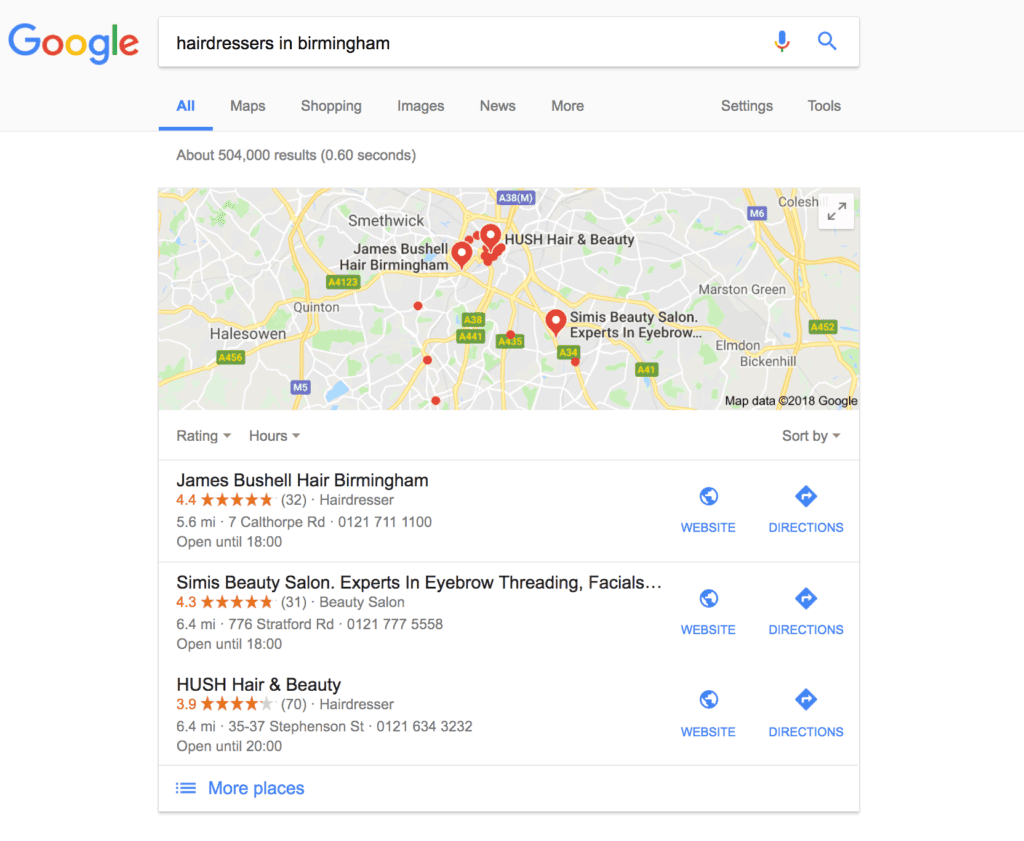
Example of localised search results in Google.
Back in 2015, Google reduced it’s 7-pack to a 3-pack meaning that we now see the three locations that Google considers to have high relevance to the user’s keywords and location. The listings are generated using Google My Business and the optimisation of those listings are essential in order to take advantage of Google’s localised strategy. This kind of local marketing provides a quick win and a great opportunity to get free organic visibility on the first page of Google if implemented correctly. The following survey from Search Engine Land shows the search ranking factors most likely to affect localised marketing, covering both local packs and localised organic search results. In both cases, Google My Business plays an important role as does on-page signals (metadata optimisation for keywords, domain authority, etc.) and link signals (linking domain authority, anchor text, etc.). In 2017, Google made further changes to ensure users are provided with local information and this is a trend we only expect to grow in 2018.
SEO Prediction 6 – there will be an increased focus on knowledge panels
Knowledge panels are another SERP feature that is likely to gain more attention from content marketers in 2018. Like local search results and featured snippets, this is another panel designed to provide relevant information to users depending on their search query. The panel displays images and data on the right-hand side of Google’s SERP, by pulling relevant data from sites like Wikipedia. For example, a search for a famous Hollywood personality (Brad Pitt for example) is likely to bring up information relating to the person and his/her career, along with images, movies acted in, etc.

Example of a knowledge panel in Google based on a search for “Brad Pitt”.
We believe that knowledge panels are likely to become more sought after in 2018 as it provides yet another opportunity to get that all-important visibility on the first page of Google. Inclusion in Google’s knowledge panels can be addressed by adding your company and brand data on sites like Wikipedia, Wikidata and Google My Business. Don’t forget the importance of structured data creation using tools like Schema.org and encouraging users to leave reviews on your website, Google My Business and other third-party review tools from around the Web, as these reviews will often show on knowledge panels and help your listing to stand out.
SEO Prediction 7 – AI and Google’s RankBrain will play a more significant role in search
Both Yandex and Baidu have joined Google in adding artificial intelligence to their search engines, with the latter being one of the world’s leaders in AI. As such, AI is an area that is shaping up to be one of the most exciting continuing trends in 2018.
Search engines currently use sophisticated algorithms based on a user’s search query to return the results most likely to match the user’s expectation. There are reported as being more than 200 factors which influence search rankings and at present. However, AI is making some great advancements in allowing search engines to ‘learn’ whether their performance is adequately meeting the needs of a user.

Artificial intelligence might not make search engines look any different but the results will be more adaptive and intuitive. Image via Wikimedia.
According to official announcements from Google, RankBrain is now the third significant factor in the ranking of websites on Google and will continue to gain importance as Google moves towards AI and machine learning systems to govern their search algorithms. RankBrain measures how audiences interact with search results and content available on pages and use this information to formulate their search results. When we click through to a page, RankBrain then measures two KPIs (key performance indicators), including Dwell time, or how long the page is able to captivate the audience; and the CTR (click-through rate). Dwell time is probably the more important of these two factors and likely to have an increasing impact on SEO in 2018. Currently, the average dwell time for a Google top ten ranked page is 3 minutes ten seconds. We expect to see search engines utilising AI more in the coming years, allowing them to tailor their services to individuals in a more adaptive way.
SEO Prediction 8 – optimisation for single keyword searches will continue to fall in favour of ‘long tail’ and Latent semantic indexing (LSI)
The long-tail search is not a new phenomenon and has been around for almost a decade. A chain of three or more keywords used to narrow the suitability of search results is usually more useful than just a single keyword search. Long tail keywords will usually drive better quality traffic than a single keyword alone and are more likely to convert. From an SEO perspective, long-tail keywords are generally less competitive and easier to rank for than single keyword searches, especially where a gap can be identified in the search results.
There is no way of knowing whether search engines place greater importance on long-tail keywords than single keywords, but it stands to reason that traffic reaching a site based on a single word rather than a specific combination of words is less attractive.
Another popular trend is Latent semantic indexing (LSI). This refers to synonyms, keywords and phrases that are closely related to (and have the same meaning) as the topic covered by the page. Using LSI, content marketers are able to create more natural, conversational content and helps them to avoid overstuffing the same primary keyword into the content. For Google and the end-user, LSI adds more context to the content and means that the right information can be delivered to the user. Discovery and implementation of LSI keywords are likely to be a growing trend in 2018, as content marketers explore every avenue to boost rankings. Popular tools include the Google autocomplete tool and the Google keyword planner tool that can help you extrapolate keywords according to context and include these as part of your keyword strategy.
In 2018, we’re going to be in an increasingly competitive landscape and can expect to see SEO strategies based around single keywords to fail while sites that maximise the benefits of long-tail and LSI keywords will see their traffic grow.
SEO Prediction 9 – mobile optimisation and adoption of AMP will be more important than ever
It is hard to believe that as we enter 2018, there is still an estimated 33% of small businesses whose website are not optimised for mobile. Back in 2012, we were stressing the importance of mobile and the trend has only grown. The figures vary depending on the sector but the following report from Reuters suggests that 75% of Internet use in 2017 will come from mobile devices and with the imminent arrival of Google’s Mobile First Index, there’s never been a more important time to make sure mobile optimisation is factored into your marketing strategies.

Mobile devices are now the primary method for accessing the internet and websites need to adapt. Image via Pixnio.
Google’s algorithm will increasingly place a greater emphasis on mobile-friendly content and will eventually replace the traditional form of desktop content being king. It’s not hard to see Google’s reasoning behind this huge shake-up of the way it ranks sites with mobile-internet usage now higher than desktop. Smartphones and tablet devices are the principle way that many users access the internet, so websites that aren’t mobile-optimised in 2018 will most likely see a decline in their traffic.
We can also expect to see further development from the AMP (Accelerated Mobile Pages) project. Designed to provide higher engagement and performance with greater consistency, AMP is an open-source project backed by Google. Though initial ‘teething problems’ have caused a divide in opinion over the project, it is likely that more big-name brands will adopt the technology causing it to become more mainstream.
As a result, SEO strategies in 2018 will need to accommodate the need for greater emphasis on mobile-friendly content.
SEO Prediction 10 – speed and page load times will continue to be an important differentiator
Google understands that speed is an important factor that affects user experience. Google is increasingly rewarding content creators who are adding value to audiences with better search rankings, and user experience is an integral part of this. Sites and pages that take too long to load are likely to lose their visitors and this isn’t something that Google values or rewards. Tools such as Google’s PageSpeed Insights, Test My Site with Google, Pingdom Tools and GT Metrix are very useful and have been designed to help website owners and developers to understand improve f<actors that are likely to impact the page load times. These factors include but are not limited to: page design, file size, CSS, JavaScript, uncompressed resources, server response time and uncompressed images. In our experience, optimising websites to load quickly and consistently, is one of the single most important factors in SEO and can result in significant improvements in rankings very quickly. This is a trend we only expect to grow in 2018.
Other trends and predictions worth noting
The reducing importance of backlinks
A prevalent and acceptable SEO strategy to build up organic search visibility is to create high quality and relevant backlinks. SEO specialists often spend time optimising and refining these links in order to improve search rankings and the strategy still works. However, going forward, we expect this to have less impact on SEO while on-site factors such as those mentioned above (keyword strategy, on-speed, mobile-friendly content, structured data, etc.) will play a far more significant role. It has been reported that the search engine Bing has already started using unlinked (link-less) mentions for ranking content, which is an interesting move away from traditional link building.
For many people, a social media campaign means Facebook and Twitter but the growth of platforms like Snapchat, Instagram and WhatsApp have demonstrated the vulnerability of putting all your eggs in one basket. True, Facebook is still the world’s dominant market leader in the social networking world, but it isn’t the only stream for marketing. And, for some companies, it certainly isn’t the most relevant or productive. Millennials, in particular, are more likely to use alternative platforms and have been shown to be more receptive to marketing over sites like Snapchat. If you don’t already know the difference between Tumblr and Instagram, Redditand Pinterest or why a YouTube channel is about more than simply sharing videos, then this is worth investigating. Social media marketing remains one of the most powerful and instantaneous ways to connect with both your existing customers and potential ones. Sharing content via social media can drive vast amounts of traffic if executed as part of an integrated marketing strategy and the audience is targeted correctly; however, our experience over recent years has shown that it doesn’t directly contribute towards SEO, certainly not as much as the other factors listed above.
Continuing growth in video and infographic marketing
We predict that visual content will become even more important in 2018. Increasingly, we are seeing that visual content such as videos and infographics are gaining popularity as audiences engage better with visual mediums. One of the biggest problems that content marketers have to deal with in 2018 is lack of engagement time and keeping visitors interested. While content saturation the internet creates fewer opportunities to get noticed, engaging visual content becomes more important and will most likely make the difference between a page that ranks and one that doesn’t. Textual content takes time to read and digest but increasingly visual content is fast gaining popularity. Researchers found that 74% of content marketers are regularly using visual media as part of their content strategy and people recalled up to 65% of content better when it carried a visual element.
Traditional content creation will always underpin the trends for visual content and multimedia campaigns, but research shows that those marketers who use video are likely to grow revenue almost 50% faster. It is also estimated that around a third of online traffic time is spent watching videos and almost 50% of people watch more than an hour a week (via Facebook and/or YouTube alone). With figures like this, the video marketing wave is far from reaching its peak.
If you haven’t already started to adopt visual content as part of your SEO and marketing strategy, then 2018 could be your moment. In many ways, this one should be in our top 10 list and only missed out by a very small margin. Just remember that videos on social media are 1200% more likely to be shared than text and images alone.
Analytics and understanding visitor journeys
Analytics has always been the cornerstone of any successful SEO campaign and the importance of understanding your audience will continue to be key in 2018. The growing influence of heat maps along with customer metrics to determine a user’s entire journey will likely dominate digital marketing reports.nThe days of single point journeys to a site are becoming a thing of the past with users often being driven through long series of touchpoints and exposure to multiple campaigns. The journey is important but enhancing the user’s experience of the destination is just as significant. SEO must work hand-in-hand with the user experience to deliver a quality service once a customer arrives on a site. This only missed our top 10 list by a small amount in favour of mobile optimisation and speed, both of which are critical elements of the user experience. We think that in the coming year, SEO will see a continued reliance on analytic metrics and this may very well enter our top 10 next year.
Consideration of other search engines
In the same way that social media is dominated by Facebook, the world of the search engine is almost entirely dominated by Google. Content creators have long been aware of the importance of sticking to Google’s guidelines and employing only white hat techniques to avoid any negative impact. However, Bing, Baidu and Yahoo still account for a reasonable percentage of the world’s market and continue to support searches from different regions and platforms across the globe. Understanding your target audience and how they are searching will continue to play an important role in SEO during the coming year. And don’t forget the importance of YouTube. Although generally considered as more of a social network and video hosting platform, many believe YouTube comes a close second to Google in the search engine market as well.
Final thoughts…
In summary, 2018 will be another busy year for digital marketers looking for ways to enhance their SEO. Leveraging existing opportunities like schema markup, featured snippets and local marketing will go hand-in-hand with exploring new ways to take advantage of emerging trends like voice search and AI. Whilst we don’t envisage any significant deaths of existing methods, the shift away from link building, single keywords and building primarily for the desktop will produce stronger SEO results. In order to adapt to this changing environment, our final piece of advice is to always keep on top of Google’s Webmaster Guidelines and don’t forget to check out their YouTube channel.
If you want to know more about how to stay ahead in 2018 or need more practical support, then contact us today on 0121 222 5757 or at [email protected]. Our team of experts at Opace can assess your digital marketing goals and help you to establish an SEO strategy tailored to your business and marketing objectives. Even if you have a digital marketing team in-house, we offer an SEO consulting service to measure the effectiveness of your digital marketing strategy with an unbiased view and we can help to coach your team on all matters related to SEO.
Hopefully, our SEO predictions will help you and your business gain valuable insight into the changing landscape of SEO over the next year and we hope that 2018 will be a great year for your business!
Featured image via Pixabay.

![Seo content creation guide for good content - why good content matters: seo content creation guidelines [updated] Seo content creation guidelines for good content](https://www.opace.co.uk/wp-content/uploads/2024/03/SEO-content-creation-guide-for-good-content-150x150.jpeg)




Feature snippets are now helping a lot in ranking a website where featured snippets help users to see more information of your website just from SERP. And for that reason I always suggest people to use featured snippets and also make sure it has been implemented properly.